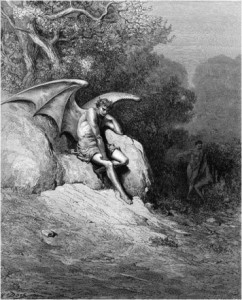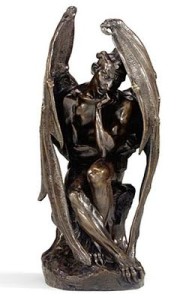1. Consequences of Adam’s sin
SR, 42: “Man was lost … The whole family of Adam must die … doomed to misery and death … I saw the lovely Jesus and beheld an expression of sympathy and sorrow upon His countenance.”
PL, Book III, 137-170: “Beyond compare the Son of God was most glorious … and in His face Divine compassion visibly appeared, love without end … For should man finally be lost.”
PL, Book III, 205-238: “He, with His whole posterity, must die.”
2. Jesus Volunteers to die for man
SR, 42: “His countenance was calm, free from perplexity and doubt… He has made known to the angelic host that a way of escape had been made for the lost. He told them that He had been pleading with His Father, and had offered to give His life a ransom, to take the sentence of death upon Himself, that through the merits of His blood, and obedience to the Law of God, they could have the favour of God.”
PL, Book XI, 15-48: “With incense, where the golden alter fumed, by their great intercessor, came in sight before the Father’s throne … My merit those shall perfect, and for these My death shall pay. Accept me. And, in me, from these receive the smell of peace toward mankind. Let him live before thee reconciled.”
PL, Book XII, 387-240: “Thy Saviour, shall re-cure, … by fulfilling that which thou didst want, obedience to the law of God, imposed on penalty of death; and suffering death … due to theirs. In His redemption; and that His obedience, imputed, becomes theirs by faith; His merits to save them.”
3. Jesus’ pledge to stand between God and the guilty pair
SR, 43: “Jesus told them that He would stand between the wrath of His Father and guilty man … He would leave all His glory in heaven, appear upon earth as a man, humble as a man…that He would die the cruelest of deaths … He told them HE would die and rise again the third day and ascend to His Father to intercede.”
PL, Book III, 205-238, 239-272: “Behold Me then. Me for him, life for life I offer. On me let Thine anger fall. Account Me man. I for His sake will leave Thy bosom, and this glory next to Thee freely put off, and for him lastly die … But I shall rise victorious.”
PL, Book III, 273-306: “Their nature also to Thy nature join; and be Thyself man among men on earth.”
4. Angels rejoiced when the plan was disclosed
SR, 44: “Then joy, inexpressible, filled heaven. And the heavenly host sang a song of praise and adoration. They touched their harps and sang a note higher than they had done before.”
PL, Book III, 341-374: “No sooner had the Almighty ceased, but all the multitude of angels, with a shout loud as from numbers without number, sweet as from blest voices, uttering joy, heaven rung with jubilee, and loud hosannas filled the eternal regions.”
PL, Book III, 341-374: “With solemn adoration down they cast their crowns inwove with amarant and gold … then crowned again, their golden harps they took, harps ever tuned … and with preamble sweet of charming symphony, they introduce their sacred song.”
Note: It is interesting to note that Ellen White does not mention ‘crowns’ in this context, while Milton says that the angels cast their ‘crowns’ as a mark of respect and adoration.
5. Angels volunteered to die for man
SR, 44: “The angels prostrated themselves before Him. They offered their lives.”
SR, 45: “Angels were so interested fro man’s salvation that there could be found among them those who would yield their glory and give their life for perishing man.”
PL, Book III, 205-238: “Which of you will be mortal, to redeem man’s mortal crime … He asked, but all the heavenly quire stood mute, and silence was in heaven. On man’s behalf, patron or intercessor none appeared.”
Note: Milton said that no angel come forward to risk his life for man. Whereas, Ellen White said that the angels were willing to die for man.
6. Father accepts Son’s proposal
SR, 44: “His death alone could be accepted of His Father. And His Father accepted the plan.”
PL, Book XI, 15-48: “To whom the father, without cloud serene: All thy request for man, accepted Son, obtain. All thy request was my decree.”
Note: Bible teaches that the plan of salvation was ordained before the foundation of the world (1Peter, 1:20). On the contrary, Ellen White’s statement tells us that the plan of salvation was made after man had sinned. Jesus had to plead with the Father to accept His plan.
7. The humiliation, death and exaltation of Jesus
SR, 44: “That by His death He should ransom many … And the father would give Him the kingdom and greatness of the kingdoms under the whole heaven, and He would possess it forever and ever.”
PL, Book III, 273- 306: “…be judged and die, and dying rise, and rising with Him raise His brethren, ransomed with His own dear life.”
PL, Book III, 307-340: “Therefore Thy humiliation shall exalt … Here shalt thou sit incarnate … Anointed universal king. All power I give thee. Reign forever…as head supreme, thrones, princedoms, powers, dominions… All knees to Thee shall bow, of them that bide in heaven, or earth.”
PL, Book III, 239-272: “Then with multitude of My redeemed shall enter heaven.”
8. Satan rejoiced at his success in deceiving man
SR, 45: “Satan again rejoiced with his angels that he could, by causing man’s fall, pull down the Son of God from His exalted position. He told his angels that when Jesus should take fallen man’s nature, he could overpower Him and hinder the accomplishment of the plan of salvation.”
PL, Book X, 341-374, 375-408: “With joy and tidings fraught, to hell he [Satan] now returned … Great joy was at their meeting … To my associate powers, them acquaint with these successes and with them rejoice.”
9. Jesus willing to be separated from Father
SR, 45: “That He would consent to leave the bosom of His Father and choose a life of suffering and anguish, and die an ignonimous death.”
PL, Book III, 205-238, 239-272: “I for His sake will leave thy bosom, and glory next to Thee freely put off, and for him lastly die … On Me let death wreck all his rage.”
10. Description of Satan after his fall
SR, 46: “That brow which once was so noble, I particularly noticed. His forehead commenced from his eyes to recede. I saw that he had so long bent himself to evil that every good quality was debased, and every evil trait was developed. His eyes were cunning, sly, and showed great penetration. His frame was large but the flesh hung loosely about his hands and face. As I beheld him, his chin was resting upon his left hand. He appeared to be in a deep thought.” (See the illustrations below).
Note: The painters of these illustrations were inspired by Milton. The earliest of the two was produced in 1833, more than two decades prior to Ellen white’s vision on Satan. So, was her description of Satan given by God?
SR, 45: “I was shown Satan as he once was, a happy, exalted angel. Then I was shown him as he now is. He still bears a kingly form. His features are still noble for he is an angel fallen. But the expression of his countenance is full of anxiety, care, unhappiness, malice, hate, mischief, deceit and every evil.”
PL, Book I, 582-615: “His form had not yet lost all her original brightness. Nor appeared less than archangel ruined, and excess of glory obscured – as when the sun, new risen … But his face deep scars of thunder had intrenched, and care sat on his faded cheek, but under brows of dauntless courage, and considerable pride waiting revenge. His cruel eye, but cast signs of remorse and passion.”
11. Angels reveal to Adam the future events- from expulsion to redemption
SR, 48: “Angels informed Adam that, as his transgression had brought death and wretchedness, life immortality would be brought to light through the sacrifice of Jesus Christ.”
SR, 48: “To Adam were revealed the future important events, from his expulsion to the flood, and onward to the first advent of Christ upon the earth.”
SR, 49: “Adam was carried through successive generations and saw the increase of crime, of guilt, and defilement. He was shown that iniquity and violence would steadily increase.”
PL, Book XI, 83-116: [Father instructs the angel Michael] “Reveal to Adam what shall come in future days as I shall thee enlighten.”
PL, Book XI, 355-388: “I am sent to show thee what shall come in future days to thee and to thy offspring.”
PL, Book XI, 423-456: “Adam, now open thine eyes, and first behold the effects which thy original crime hath wrought in some to spring from thee, who never touched the excepted tree … yet from that sin derive corruption, to bring forth more violent deeds.”
PL, Book XI, 457-490: “By violent stroke shall die; by fire, flood, famine; by intemperance more in meats and drinks, … what misery the inabstinence of Eve shall bring on men.”

